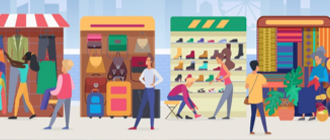
Top 3 Trends For The Future Of Entrepreneurship
By Kawal Preet | First published: March 19, 2021 Updated: January 16, 2023
In today’s workplace, becoming an entrepreneur is now the first choice for young people in Asia, who aspire to founding new businesses or start-ups over traditional employment.
The COVID-19 pandemic continues to have a major impact on the $100 trillion global economy - from job insecurity and rising unemployment to huge stress on people and healthcare services. At the same time, we’ve seen positives emerge. Small businesses tapping into e-commerce for the first time. Greater use of technology. More flexibility in the workplace, including working from home.
Much has been written about the future of work after COVID-19, but what about the future of entrepreneurship? How will economic or geopolitical disruption affect the next generation of SMEs?
What’s clear is that becoming an entrepreneur is fast becoming the number one choice for “Generation Next” and Gen Z. Many young people are breaking away from salaried jobs. And it’s not just established businesses that help society get through periods of economic crisis or recession. It’s the new generation of up-and-coming entrepreneurs who can deliver innovation, ensure future sustainability, and build strong, equitable, economies that benefit everyone.
I see three key trends shaping this:
1. Defined by digital; agility, resilience and speed
The entire model for global entrepreneurship is evolving at high speed. The future is being defined by digital. The World Economic Forum’s latest study into the Future of Jobs finds that there needs to be a ‘massive reskilling of the digital economy’ to ensure all businesses are future-ready and sustainable. In today’s hybrid working environment, there’s also rising demand for skills such as active learning, stress tolerance and flexibility.
We’ve already seen how companies that moved quickly during crisis had a strategic advantage over competitors. Today, people can work and buy goods from anywhere. With millions still working from home, firms that delivered fast but continued to provide exceptional service gained loyal customers.
Consumer expectations have changed. People are much more at ease with using new technology. COVID-19 was a major catalyst for digital entrepreneurship in the same way that other crises and health emergencies sparked positive change in the past.
It is certainly becoming easier to become a global entrepreneur.
Another positive aspect to emerge from COVID is that barriers to entrepreneurship have been lowered – particularly through digital. It is certainly becoming easier to become a global entrepreneur. Cloud-based tech has more than halved costs in starting and running a business, according to Gartner. It’s also much easier to access new technology. Websites and platforms that integrate a tech stack enable SMEs to market products to a wider audience, with better connections between buyers, sellers, and partners.
While all these shifts aren’t new, the acceleration we’ve seen through COVID is. According to McKinsey, businesses that once mapped digital strategy many years ahead have been able to scale those same initiatives in a matter of days or weeks. The speed of change has been phenomenal.
2. A new age of diverse entrepreneurship
The world is entering an exciting new age of entrepreneurship. That means more women, more young people, and more entrepreneurs from diverse backgrounds.
In our increasingly connected world, access to technology enables start-ups from Ghana to Bangladesh to participate on the same global stage as those in more developed countries.
This diverse entrepreneurship is fed by an enormous talent pool, and Asia-Pacific stands out. The region has almost 60% of the world’s youth population, a huge resource of 750 million young people aged 15 to 24. As we see more barriers to entrepreneurship falling, we’ll see far greater opportunities for young people everywhere – from every country and culture, from every sector and society, all contributing different talent and points of view.
Access to technology enables start-ups from Ghana to Bangladesh to participate on the same global stage as those in more developed countries.
So it’s important not just to “teach” or guide entrepreneurship, but to embed it in post-COVID recovery and reset what has gone before. How we work to find, fund and support the next generation of diverse start-ups and entrepreneurs is going to drive long-term recovery.
Asia, the Middle East and Africa are fortunate to have some of the most thriving start-up ecosystems in the world. There’s a lot of support for new entrepreneurs and venture capital models at a time when e-commerce and cross-border trade is booming. But there’s still not enough focus on the practical elements of scaling up and growing a global business.
How can SMEs seize the digital advantage and innovate on a global scale?
Getting into the intricate detail of supply chains, trading across borders, and government regulations is difficult. That’s where our expertise at FedEx comes in. Just as commerce is constantly changing, we at FedEx are moving towards a digital future where “now meets next”. Over the past few years, we’ve been working to help SMEs achieve digital transformation, increase their online presence and get access to e-commerce shipping tools.
Our job is to make commerce easier for all entrepreneurs so their businesses grow and thrive. To do so, it’s vital to know just where people are spending time online - and how long for. That knowledge is key to what I believe is the third trend for future entrepreneurship.
3. Location-independent solutions
The pandemic has created opportunities for entrepreneurs and changed how we all work – possibly for good. Future entrepreneurship will be defined by new solutions that work anywhere. Solutions independent of location, serviced by remote workers.
Take healthcare, which has completely transformed in a short period of time. Society is now far more invested in telehealth, remote diagnostics and medical devices. At FedEx, we’re on the frontlines of healthcare and we see these trends play out in real-time. We’ve been transporting medical technology, new pharma and material for clinical trials for years. Now we are doing some of the most important work we’ve ever done – shipping vaccines. We’re understandably proud of the tremendous efforts of FedEx teams worldwide in COVID-19 vaccine delivery.
In other sectors, technology is creating an environment that is location-independent, mobile-first and social-commerce centric. The new generation of successful entrepreneurs are digital nomads already.
Finding the next wave
At FedEx, we are in the entrepreneur-growing business; always searching for the next wave of innovation. Not just because it will help grow our business, but because entrepreneurship is key to global recovery. For the past 16 years, we’ve supported the annual APAC-wide competition in conjunction with Junior Achievement providing a platform to the next-generation of young student entrepreneurs.
Once, education focused on heading to university or landing a full-time job with an employer. Now we have come full circle. Becoming an entrepreneur will be the first choice for many because the world is moving so much faster - and is more digitally-empowered - to make that happen.
As we look beyond the pandemic, it is clear entrepreneurship will not return to what it was. It will be even better. Future entrepreneurship has the potential to be the ultimate global equalizer, creating many more opportunities for many more people.
SHARE THIS STORY
- How To Ship A Giant Panda
- How To Make Freight Shipments Work For Your Small Business
- The Rise Of Intra-Asia Trade: Opportunities In The China-Southeast Asia Corridor
- Southeast Asia's Role In Global Manufacturing Supply Chains
- 8 Most Unusual Shipments In The History Of FedEx
- Where Do Old Planes Go When They Retire?
Sign up now and save on your shipping rates!
Sign up now and earn discounts by shipping instantly with FedEx Ship ManagerTM at fedex.com.
Recommended For You

Young Entrepreneurs Leverage New Opportunities To Grow
Economic incentives and emergent technologies welcome young entrepreneurs to the table. The right resources to launch and grow can be a game-changer.
Read More
Finding The Talent Of Tomorrow: Our Youth Entrepreneurship Competition
Our International Trade Challenge is an annual contest to find the best entrepreneurial minds amongst students in Asia Pacific.
Read More
How To Start A Small Business In Asia
We spoke to a range of small businesses in Asia for tips on bringing your products to new global audiences and expanding business through e-commerce.
Read More



